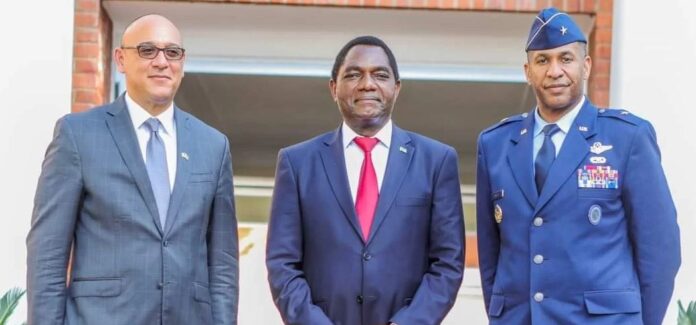AFRICOM COMES TO ZAMBIA-Is Zambia Shifting Its Foreign Policy?
By Amb. Emmanuel Mwamba
In 2007, the USA Pentagon sought to locate its newly formed Africa Command (AFRICOM) somewhere in Africa, and Botswana and Liberia were reportedly eager to host it.
But South African President Thabo Mbeki led and mobilised member states of the African Union to oppose the USA move.
African leaders expressed fear that if the USA would be allowed to host AFRICOM in Africa, this would constitute an unacceptable violation of Africa’s sovereignty.
The USA eventually backed down and opted to host AFRICOM at Kelley Barracks in Stuttgart, Germany where it remains todate.
Fifteen (15) years later, AFRICOM is reportedly looking for a new home and the question still arises again especially in a now different political and military context, if Africa will be persuaded to host it.
In 2020 AFRICOM commander General Stephen Townsend announced that: ‘US Africa Command has been told to plan to move.’
This was part of the Pentagon’s plan to withdraw 12,000 troops from Germany after President Donald Trump at the time, decided to cut back on America’s military presence in Europe.
If Mbeki and other African leaders thought that keeping the USA Command on Africa offshore would keep the USA military presence at bay, they were mistaken.
The USA has since through AFRICOM increased its military activity in Africa.
AFRICOM now has 15 “Enduring” bases and 12 less permanent “Non-enduring or contingency” bases in Africa and 7,000 Special Forces on rotation in Africa carrying out joint operations with national militaries.
Another 2,000 soldiers are conducting training missions in some 40 countries.
WHAT IS AFRICOM?
The U.S. Africa Command (AFRICOM) headquartered in Stuttgart, Germany, is one of the eleven U.S. Department of Defense combatant commands that provides command and control of military forces in peace and war.
According to website, AFRICOM employs the broad-reaching diplomacy, development, and defense approach to foster interagency efforts and help negate the drivers of conflict and extremism in Africa.
And it’s primary Mission is to promote USA Interests in Africa.
AFRICOM states that with partners, counters transnational threats and malign actors, strengthens security forces and responds to crises in order to advance U.S. national interests and promote regional security, stability and prosperity.
WHY AFRICA? FIGHTING AIDS, HUNGER AND TERRORISM
In 2007, Africa’s profile rose sharply during the George W.Bush Administration.
President Bush expressed the strategic change in unequivocal terms; “Africa is increasingly vital to our strategic interests. We have seen that conditions on the other side of the world can have direct impact on our own security “.
Bush launched a number of programmes including; Millennium Challenge Account, the President’s Emergency Plan for AIDS Relief (PEPFAR), the President’s Malaria Initiative, the Congo Basin Forest Partnership and the Initiative to End Hunger I Africa.
On the military side, he established a new combatant command, the US. Africa Command (AFRICOM).
CONCERNS FROM AFRICAN UNION & SADC
Both the African Union and SADC have resisted facilitating USA military presence, military bases or security offices being established among their member States in Africa.
The AU is formally opposed to foreign military bases and the Peace and Security Council cautions member states from entering into military agreements that would lead to the establishment of foreign bases in their countries.
Africa sees AFRICOM as a springboard for further USA exploitation of the continent and interference in domestic affairs.
The Africa Union and SADC have promoted Africa’s own security architecture; the African Standby Force (ASF) and the SADC Brigade.
The SADC Brigade supports regional peace operations under the African Standby Force Policy Framework.
The Brigade, launched in August 2008, is made up of military, police and civilian members from SADC Member States.
This allows Africa to seek military military-to-military partnerships with different and wide-ranging stakeholders, states and powers to improve the capacity and operability of its armed forces.
This also gives Africa an opportunity to seek cooperation from any power whether it’s USA, China or Russia than a hegemonic presence of one dominant power in Africa.
FOREIGN BASES IN AFRICA
Djibouti, with its strategic location on the Red Sea and commanding the el-Mandeb Strait, is the epicentre of this foreign military presence in Africa.
It hosts seven armies and most of the Horn’s 11 military bases.
Foreign militaries have various motives for coming to Africa.
Much of the growing foreign military presence is about advancing global superpower rivalries.
Some foreign forces are however trying to help keep violent extremists at bay.
Africa’s motives are equally varied.
Some insecure leaders are still using foreign armies to prop them up – France in Chad and Russia in the Central African Republic for example.
But again, some need the foreign soldiers to help curb violent extremism.
ZAMBIA TO ALLOW AFRICOM OFFICE
On April 25, the U.S. government announced that AFRICOM will open an Office of Security Cooperation at the U.S. Embassy in Zambia.
Visiting AFRICOM Brigadier General Peter Bailey, Deputy Director for Strategy, Engagement, and Programs, made the announcement during a meeting with His Excellency President Hakainde Hichilema.
CONCLUSION
President Hakainde Hichilema is encouraged to consult widely in Zambia and with his colleagues in the SADC Region before rushing to allow such security agreements with far reaching consequences in Zambia and the Sub-region.
Zambia has a long history of the non-alignment policy.
President Hichilema may also take interest to undetstand why the last four presidents; Levy Mwanawasa SC, Rupiah Bwezani Banda, Michael Chilufya Sata and Edgar Lungu refused AFRICOM’s presence in Zambia and why Zambia stood with both SADC and African Union on the matter.
ABOUT THE AUTHOR
The Author is former Ambassador to Ethiopia and former Permanent Representative to the African Union and to the United Nations Economic Commission for Africa.
He is also an expert in Peace and Security having done his Masters Programme in the field area.
